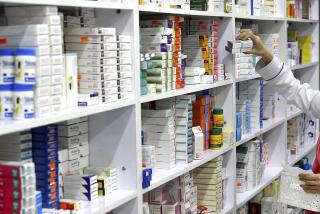A Question of Drug Quality Abroad
- Share via
Buying and taking medicines while traveling abroad can be risky business. The quality of both prescription and nonprescription drugs in some destinations has long been a concern of public health officials, travel medicine doctors and veteran travelers. Horror stories abound about counterfeit or substandard drugs resulting in disastrous outcomes for ill travelers.
But just how widespread is the problem and what is being done to correct it? What can travelers do to protect themselves?
The problem is real, conclude three British researchers who collected samples of commonly used drugs from two countries, analyzed them and published their results last fall in the journal Tropical Medicine and International Health.
Researchers from the School of Pharmacy at Robert Gordon University, Aberdeen, Scotland, and the Hospital for Tropical Diseases, London, collected 96 samples from Nigeria and Thailand of the antimalarial drug chloroquine and several frequently used antibacterials. Besides collecting chloroquine, the researchers gathered amoxycillin, tetracycline, co-trimoxazole (trimethoprim and sulphamethoxazole) and ampiclox (ampicillin and cloxacillin). The drugs were obtained at random from a variety of outlets.
Next, the researchers analyzed the samples to determine the active ingredient, the level of active drug and whether any decomposition had set in.
Their findings: 36% of samples collected in Nigeria and 40% of those gathered in Thailand were substandard in some way, containing quantities of active ingredients (the substance or substances that cause the desired effect) that were outside the limits set by British pharmaceutical standards, which are similar to U.S. standards. The analysis of six samples, for example, detected no active ingredient at all, according to the researchers. They did not, however, find any obvious labeling errors and none of the expiration dates on the labels had yet passed.
The researchers concluded that their study provides evidence that “substandard drug preparations are present in significant proportions in these areas of the world, posing a considerable hazard to health. . . .”
Meanwhile, the World Health Organization is continuing its efforts to improve the quality of medicines globally, said Enrique Feser, a pharmacologist and WHO’s coordinator for the essential drugs and technology program. This year, for example, WHO will train government inspectors in Latin America by teaching them how to do quality inspections of drug manufacturing plants.
Travelers should put the risk in perspective and learn how to minimize it, experts said. Even in the United States, consumers can end up with medicines for which the expiration date has past, said Dr. Rex Yung, a USC assistant professor of medicine on staff at USC University Hospital and Ambulatory Health Center, which provides travel medicine services. (Expiration dates are assigned to drugs to ensure that they are sold while they retain their effectiveness.) Yung thinks the researchers should have sampled medicines not just from Nigeria and Thailand but also from the United States and Britain, and then compared results.
Travelers should also be aware that some destinations pose more potential problems than others, Yung added, with developing countries and rural areas generally more risky than developed countries and urban areas.
When in unfamiliar locales, he said, travelers can call a chain hotel and ask the manager there to recommend a local health-care provider. The embassy is another source for referrals.
Travelers should also be alert when purchasing medicines overseas. Generally, an over-the-counter drug made in the United States is safe. But improper storage or handling, once it is sent overseas, could affect potency, said a spokeswoman for a major U.S. pharmaceutical firm. Prescription drugs made by a U.S. firm but manufactured by its affiliate companies overseas must meet the standards of the country they are manufactured in. However, those standards could differ from U.S. standards.
Travelers who are on regular medication should take along what they consider an adequate supply, plus 25% to 50% more, Yung said.
Travelers should also take along extra copies of the prescription for any drug taken on a regular basis, advised Neil Badlani, pharmacist and owner of B&B; Pharmacy in Bellflower. The extra copy should contain the drug’s brand name and the generic name, which could be even more important overseas.
In the United States, for example, doxycycline is the generic name for an antibiotic used to treat many types of bacterial infection. It is also called by brand names Vibramycin, Doryx and Vibra-Tabs. Overseas, the brand name is likely to be different.
Travelers who become ill abroad and need to have a prescription written should do some investigative work before having it filled, Badlani said. “Most countries have the equivalent of our Physicians’ Desk Reference,” a book used by doctors that contains prescribing information on more than 2,500 drugs, he explained.
Look at the label to be sure the expiration date has not passed and that it contains only the drug prescribed by the doctor, Badlani added. Combinations of drugs are common in some locations.
If there is a choice between taking the medicine in pill, liquid or injection form, avoid the injection, experts advise, to minimize risk of hepatitis B or HIV transmission from a contaminated needle.
Travelers should also check to see if the medicine has a package insert (printed information, provided by the manufacturer, explaining how the drug works, who it’s indicated for, possible adverse reactions and usual dose), is made by a familiar international company and is distributed in its original container, suggested Dr. Cyrus Hopkins, director of the Travel and Immunization Clinic at Massachusetts General Hospital. All are good indications--though certainly not foolproof ones--that the medicine is of high quality, he said.
The Healthy Traveler appears the second and fourth week of every month.






